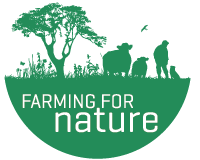Tom Barry
Tom Barry is a conventional tillage farmer farming 243 hectares (600 ac) in Killavullen, Co. Cork. Tom and his family farm with 3 core principles in mind; ‘that it’s a beautiful place to live, work and to pass on, that yield is high and that the carbon footprint is low if not negative’. Being clever with nutrients is a priority for him ‘everything is gradual, we don’t slash everything overnight’. He is a big advocate for spreading slurry at optimal times, on standing crops and not wasting it spreading as soon as the window opens when the nitrogen can’t be used properly. Due to the high organic matter in his soil and a fine gardener’s tilth, he has reduced bagged nitrogen use by up to half on some of his crops. ‘When fertiliser prices went crazy, that didn’t bother us at all, it’s about having robustness on the farm, you’ll not just survive, you’ll thrive’.
He utilises a strong rotation producing Winter Barley, Winter Wheat, Spring Oats, Winter Rye, Winter Beans, Spring Beans and Spring Barley. Integrated pest management is another key practice that drives his successful business. By allowing weeds to grow, then being ploughed back in, the weed burden subsequently is dropping all the time. He says ‘farming with nature doesn’t mean the farm can’t be commercial’. He has 40 acres under broadleaf forestry and 6 acres planted with bird cover under ACRES to protect the hen harrier. There is strong owl protection on site with lots of birds utilising the cover in the tillage fields.
NOMINATOR: Rachel Martin, Farming Editor, Irish Examiner
NOMINATION:
Every time I speak to Tom Barry he is always trying something new to make his farm more sustainable economically, socially and environmentally.
Tom uses a combination of conventional and pioneering farming techniques to achieve high yields for his tillage farm with a low carbon footprint. He is an excellent example of what modern farming should be about.
He has achieved this by focusing on soil health, minimising his use of artificial fertilisers, herbicides and fungicides. He has developed his own circular bioeconomy, importing pig and cattle slurry from neighbouring farmers, and selling all of his grains and beans within a 20-mile radius of the farm. Very interestingly, he also uses all of his bean straw as a biomass fuel source, replacing diesel in his grain drier.
Tom's farm comprises of 600 acres, including 40 acres of forestry. Crops include winter barley, winter rye, winter wheat, winter oats, winter beans along with spring barley.
Tom also writes for the Irish Examiner as one of our regular Signpost columnists, and helps to encourage other farmers to make simple changes to their farming practices to improve their sustainability. Through the project, he has got his farm to be very close to carbon neutral.
As a result, of making use of the neighbouring farms' slurry, he has reduced the farm's bagged fertiliser requirement on spring barley by 50% and by 33% on winter crops.
Considering that approximately 70% of the carbon footprint of tillage is due to artificial fertilizer use, the increased precise application of organic material has also been very beneficial to achieving his goal of carbon neutrality.
Another consequence of this was that it eliminated the need for the application of trace elements as they were present in the imported slurries. Tom also has managed to increase his yields from an average of 9.4t/ha to 12t/ha in two-row winter barley. This increased yield was in part because the organic matter in the soil was releasing tiny amounts of nitrogen to the growing winter barley plant over the winter period. This source of nitrogen encouraged and maintained plant tillers in late winter/early spring, laying the foundation for a high-yielding crop. Another benefit was that because his crops were healthier, they required less protection, reducing the need for fungicides.
It is clear Tom has a strong sense of "doing the right thing" and is aware of the 'social licence' and responsibility farmers have as custodians of the land. Tom's son and daughter are both involved in his business, and he is keen to encourage them both to get into the business. He is passionate about farming in a sustainable way, but also ensures that all his decisions make business sense too well into the future.
